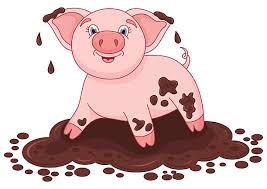Are You an Eagle or a Hog?

At Brigham Young University many years ago, there was a great athletic coach named Eugene L. Roberts. He grew up in Provo and, as a youth, sort of drifted aimlessly with the wrong kind of friends. And then something remarkable happened. I am going to read to you from his own words. He wrote:
"Several years ago when Provo City was scarred with the unsightly saloon and other questionable forms of amusement, I was standing one evening upon the street waiting for my gang to show up when I noticed that [the Provo] tabernacle was lighted up and that a large crowd of people were traveling in [that] direction. I had nothing to do so I drifted over [there] and drifted in. I thought I might find some of my gang, or at least some of the girls that I was interested in. Upon entering, I ran across three or four of [my] fellows and we placed ourselves under the gallery where there was a crowd of young ladies, who seemed to promise [some]entertainment.
We were not interested in what came from the pulpit. We knew that the people on [the] rostrum were all old fogies. They didn’t know anything about life and they certainly couldn’t tell us anything, for we knew it all. So we settled down to have a good time. Right in the midst of our disturbance there thundered from [the] pulpit the following [statement]:
“You can’t tell the character of an individual by the way he does his daily work. Watch him when his work is over. See where he goes. Note the companions he seeks, and the things he does when he may do as he pleases. Then you can tell his true character.”
I looked up towards the rostrum because I was struck with this powerful statement. I saw up there a little dark-haired, fierce-eyed, fighting man whom I knew and feared; but didn’t have any particular love for. . . .
. . . He went on to make a comparison. He said:
“Let us take the eagle, for example. This bird works as hard and as efficiently as any other animal in doing its daily work. It provides for itself and its young by the sweat of its brow, so to speak; but when its daily work is over and the eagle has time of its own to do just as it pleases, note how it spends its recreational moments. It flies to the highest realms of heaven, spreads its wings, and bathes in the upper air, for it loves the pure, clean atmosphere, and the lofty heights.
“On the other hand, let us consider the hog. This animal grunts and grubs and provides for its young just as well as the eagle; but, when its working hours are over and it has [some] recreational moments, observe where it goes and what it does. The hog will seek out the muddiest hole in the pasture and will roll and soak itself in filth, for this is the thing it loves. People are either hogs or eagles in their leisure time.”
Now . . . when I heard this short speech, I was dumbfounded. I turned toward my companions abashed for I was ashamed to be caught listening. What was my surprise to find everyone of the gang with his attention fixed upon the speaker. . . .
We went out of the tabernacle that night rather quiet and we separated from each other unusually early. I thought of that speech all the way home. I classified myself immediately as of the hog family. I have thought of that speech for years. That night there was implanted in me the faint beginnings of an ambition to lift myself out of the hog group and to rise to that of the eagle. . . .
There was implanted that same evening also the faint beginnings of an ambition to help fill up the mud holes in the social pasture so that those people with hog tendencies would find it difficult to wallow in recreational filth. And as a result of constant thinking about that speech I have been stirred to devote my whole life and my profession towards developing wholesome recreational activities for the young people, so that it would be natural and easy for them to indulge in the eagle type of leisure.
The man who made that speech which has affected my life more than any other one speech I ever heard was President George H. Brimhall. God bless him."
Quoted by Sharon Eubank, "Turning Enemies into Friends", BYU Speech January 23, 2018.
Printable PDF Version of This Parable